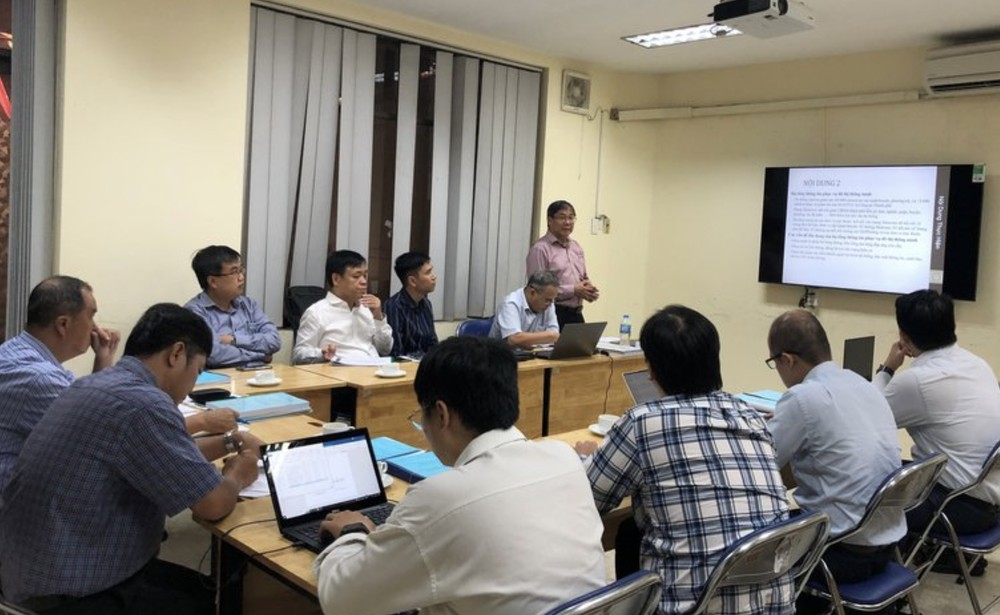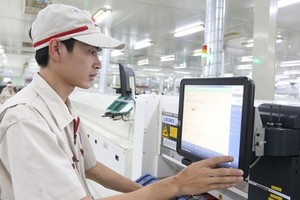 |
Mr. Tan Hanh and his research team speak about the broadband network for a smart city |
The southern largest city always encourages scientists at universities and institutes to link more with businesses, especially in tasks related to four key industries of the city, forming practical researches. Thanks to the city’s support, many scientists in Ho Chi Minh City have had remarkable scientific research works which are oriented to the needs of the community.
Currently, Ho Chi Minh City's dedicated broadband network (identified as MetroNet network) has made connections between the municipal People's Committee to localities and units. However, the MetroNet network still has some limitations such as difficulty in expanding bandwidth, difficulty in adjusting bandwidth between units, and uncertain security when many groups of customers simultaneously run other data on the same cable.
Therefore, experts from the Ho Chi Minh City-based Academy of Post and Telecommunications Technology have decided to re-designing a broadband network for a smart city. Broadband network for smart city basically has a three-layer structure, including the Core layer, the Aggregation layer and the Access layer which are designed to ensure wide-scale deployment as well as the fast development of services.
Mr. Tan Hanh from the Institute of Post and Telecommunications Technology said this is the infrastructure to ensure connectivity, meet the needs of flexible development, and at the same time can take advantage of the existing network infrastructure of current telecommunications service providers.
Elsewhere in the city, in order to have a scientific basis for assessing the current status of self-cleaning and forecasting the water quality of the main canal and canal system in the inner city, a group of scientists from the Southern Regional Hydro-meteorological Station has conducted a survey to assess water quality and self-cleaning ability and build an automatic water quality forecasting system. Since then, the research team has completed building a set of hydrological and hydraulic models, serving the construction of water quality zoning maps, and building an IT platform to process the database to deliver a timely warning about water quality.
According to Ms. Le Thi Phuong Truc, the IT platform ensures complete automation of the operation of the water quality forecasting system with the goal of meeting the requirements of smart environmental management in smart cities.
Another group of scientists worked on a project as they realized the need to deploy electronic medical records at medical facilities. A team of expert medicals at the University of Science and Technology has worked on a project 'Building and testing a data standard set based on international standards HL7 FHIR and DICOM for electronic medical records and data communication between hospitals'
This application has well served the needs of hospitals.
The Ho Chi Minh City Department of Science and Technology, the city has encouraged scientists at schools and institutes to link more with businesses. Prior, the Department has advised the municipal People's Committee to issue a program of scientific research - technology development and improve the city’s potential of science and technology for the period of 2021-2025.
Out of 212 registered tasks, up to now, 91 tasks have been successfully evaluated by the Council and proposed to be implemented. The Department of Science and Technology signed a contract to implement 64 new tasks with a total budget of VND113,567 billion.
Between 2021 to 2025, Ho Chi Minh City will improve the operational efficiency of public science and technology groups. The city also promotes the development of an innovative start-up ecosystem, improving labor productivity, quality and competitiveness of enterprises.
In addition to the linkage between enterprise, schools and government, the city will promote the implementation of science and technology tasks for international cooperation as well as transfer key technologies to support enterprises to apply in production and business activities.
Accordingly, Ho Chi Minh City has implemented six scientific and technological research programs, including a program of research and development of technology applications for smart cities and digital transformation; an Industrial technology application research and development program; a research program and technology application for health care and protection; program of research and development of high-tech agricultural applications; applied research program for urban management and development and young science and technology incubator program.
Mr. Nguyen Viet Dung, Director of the Department of Science and Technology of Ho Chi Minh City, said that science and technology tasks ordered or supported by Ho Chi Minh City need to directly solve the city’s existing problems; support enterprises to improve productivity, quality and competitiveness; and improve the city’s science and technology potential. All will be oriented toward the city's innovation ecosystem.
























